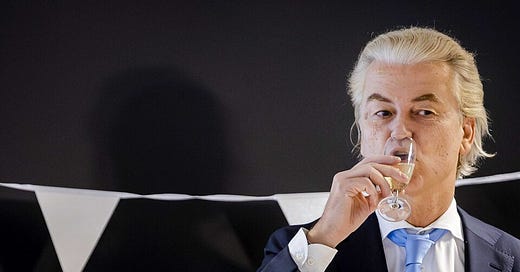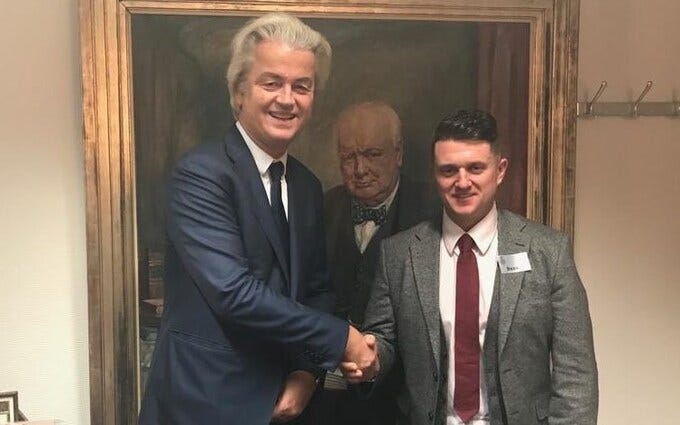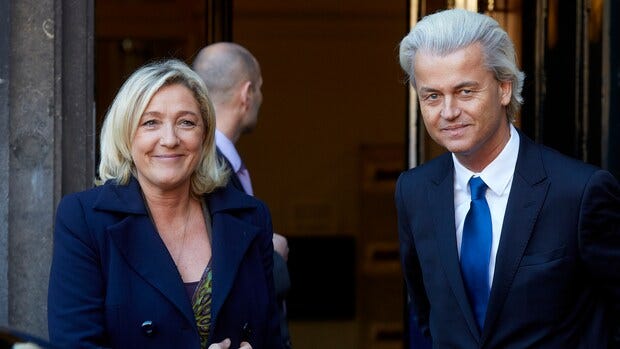Why the Dutch voted for Geert Wilders
And what our collective shock says about cultural stereotypes.
So, 2.3 million Dutch people just voted for a far-right provocateur who was once denied entry into the UK for holding views that “threaten community harmony and therefore public safety”. Often called ‘the Dutch Donald Trump’ for his blonde mop of hair, lone-wolf status, and his blunt and shocking rhetoric, Geert Wilders’ Party For Freedom (PVV) won 37 seats out of 150 – a result that secured a comfortable lead and surpassed preliminary poll predictions.
To give you an idea of just how extreme this man is, here are some of his party’s 2023 policy pledges:
Completely end asylum for all refugees.
End free movement of labour for EU workers (with visas introduced for some).
Ban all mosques, Islamic schools, Qurans, and headscarves in government buildings.
“Zero tolerance for street scum” (actual quote).
Preventative detention for suspected terrorism supporters.
End nitrogen and Co2 reduction laws; stop coal and gas power station closures; increase North Sea gas extraction and invest in nuclear power. Withdraw from all climate accords. No wind turbines, no solar panels.
Withdraw previous apologies for slavery. End “left-wing hate of our historical heroes”.
Stop providing government literature in Arabic and Turkish.
Halt all art and culture subsidies.
Hold a Nexit referendum and, until then, cut all EU funding.
Bring back Zwarte Piet.
For anyone who cares about social and religious tolerance, human rights, the EU, the climate, and art and culture, this is obviously terrifying. More so when you realise that this is actually a toned down version of previous PVV policy manifestos. Indeed, when Wilders said, “There are more important priorities” than banging his anti-Islam drum on this campaign trail, it was considered a huge concession from a man who led a crowd chant in 2014 of “We want fewer Moroccans!” (for which he was arrested) and who, in 2017, called all Moroccan immigrants “scum”.
Panic not: Wilders will not automatically become PM
There is some hope though. The Dutch political system is coalition-based (no single party has obtained more than 50% of the votes in the country’s parliamentary history), meaning three or four parties must form a government together. This may be incredibly tricky for the PVV, with many leaders already stating their refusal to work with Wilders. However, a lot can change when you sweep in on a landslide, so let’s see. (The VDD, ‘Teflon’ Mark Rutte’s previous party, has just announced it will not be part of the next cabinet.)
Whether Wilders can form a government or not, the negotiation process is likely to take a very long time (the 2021-2022 process took either 271 or 299 days, depending on which report you read, but either way, an astonishing figure). And, while that’s rumbling on, the previous government acts as a caretaker, looking after the running of things, but is not allowed to negotiate any new business. So, for nearly 10 months last year, the Netherlands was essentially at a political standstill – and the same can be expected this time around, if not for longer.
Wilders, therefore, may not become prime minister at all and, even if he does, the coalition process of endless compromise means the more extreme aspects of his manifesto will never get out of the door – a tiny silver lining to a big black cloud. (This Guardian article offers a pretty coherent breakdown of the Dutch political system.)
Right! Still with me? PLEASE COME BACK. IT’S TAKEN ME DAYS TO UNDERSTAND ALL THIS.
But why did the Dutch vote for this man?
The Dutch voted for Wilders for lots of reasons – many of which will sound familiar to Brits and Americans who have witnessed populism run rampant through their own countries. Decades of conservative governance and austerity policies have stripped public services while the cost of living crisis rages on. Housing is unaffordable for many, especially young people, on top of a distinct lack of available properties. Healthcare is insurance-based and expensive. Government has been plagued by numerous scandals over many years (some of them eye-wateringly bad). And, an influx of asylum seekers and refugees has seen emergency shelters pop up all over the country – mostly outside major city hubs – dovetailing into the existing housing crisis (a big part of what brought down Rutte’s previous government).
“When you look at the electorate of the PVV in general, it consists of people who experience more difficulties to get by,” Matthijs Rooduijn, associate professor of political science at Amsterdam University, told the Guardian. “They are more lonely. They feel that they are being neglected. They have tough lives basically, economically but also culturally.”
In short: the working class and those who live outside metropolitan cities feel neglected, patronised, and misunderstood by an increasingly untrustworthy political elite who keep getting caught up in terrible scandals. (Sound familiar?) The recent farmer’s protests will also have convinced many that they’re not being represented, that they’re considered expendable, and that climate change policies are being prioritised over livelihoods.
All of which means, when a straight-talking politician claims to be focusing on “the Dutch”, workers, healthcare, immigration and the cost of living crisis – and is a total outsider to those you blame for your current situation – he can seem like a worthwhile punt to those at the end of their tether. Especially if he’s toned down his more outrageous chat.
It’s also worth bearing in mind that sometimes these votes are acts of protest against the establishment. Two fingers up to way things are being done.
Knowing all that, why is everyone so shocked by the result?
Many of us have a totally unrealistic and idealised view of Dutch culture. That, coupled with the fact that the Netherlands rarely makes international news, means a lot of people probably didn’t know any of the above was happening. And, if you’d never heard of Wilders before, it may have seemed like this floofy-haired anti-everything firebrand popped up out of nowhere, when actually he’s been loitering in the political wilderness for 20-odd years already (please note the satisfying pun there).
When the results hit, as an expat here, I received a lot of horrified messages from friends back home along the lines of “WTF? I never thought this of the Netherlands!” One person even asked if it was a fix. This sentiment has been echoed by international newspapers, none of which can seem to believe that Holland – a left-leaning, weed-smoking, sex worker-bothering, bike-riding utopia of tolerance and liberalism – has seemingly spat in the face of everything it’s known for. (This New York Times’ headline is a great example.)
And yet, the Netherlands is conservative (with a small ‘c’) pretty much across the board. It is one of the wealthiest countries in the world for a reason, folks: it looks after its assets and plays its cards close to its chest. Change is hard-fought for, traditions honoured, and risks carefully weighed.
Yes, aspects of its culture and infrastructure are very progressive. However, it is us non-Dutch who leap onto these examples and make them representative of the whole. For example, while we see the legalisation of sex work and weed as major wins for the libertines, it actually just makes economic and social sense. They can be controlled – ergo, they shall be controlled (like the water!). And, if the ratbag tourists who can’t control themselves go too far (i.e. the Brits), all bets are off.
An unease at rocking the boat is also deeply entrenched in Dutch society. As mentioned previously in my piece on ‘Dutch Circles of Death’ (well worth a read if you fancy a bit of light relief, although I find these circles almost as terrifying as Wilders), there is a saying here: “Doe maar normaal, dan doe je al gek genoeg” – “Just act normal, that’s crazy enough”.
Before moving here I, as a Brit, had been sold a view of the Dutch that was actually deeply unfair and held no historical context. Learning that was a massive shock to the system – and I see that same shock now reverberating around Europe.
Yet, when you step back, is the result really such a surprise in a country that is grappling with a housing, migration and cost of living crisis, has a strong agricultural background threatened by a shortage of housing and necessary climate controls, is struggling with a country-versus-urban divide, has an ageing population, still allows people to dress up as Zwarte Piet (google at your own risk), only apologised for its role in the slave trade last year, and has had a right-of-centre government for decades?
Just One More Thing…
We are lucky in that Wilders will be tempered by the reality of governing within a coalition. However, the result should wake everyone up to the realities of populism. Lots of Dutch people feel the same sense of shame as many Brits did (hi!) upon learning of the Brexit result. But maybe the real shame is how many of us are still complacent about the impact and power of this kind of rhetoric. Europe is swinging to the extreme right and language that used to get people thrown out of pubs is now being used – and defended – in parliaments. The bar for acceptability is getting ever lower. We have come to expect people like Trump, Wilders, Orbán, Le Pen, and now Suella Braverman, to say horrendous things and so tolerate it from them – and in doing so normalise it. We shouldn’t. And results like this prove why.
If you enjoyed this piece – hmm, actually, ‘enjoy’ is a strong word here, instead I’d better say if you found this piece interesting or useful, please leave a comment, like, or share and subscribe. It really helps. Thank you!








Great piece! It feels flippant to say this after reading such an articulate and thorough article about Wilders, but it is quite incredible that three of the most prominent ‘3P’ politicians (Populist, Polarising & Post-Truth) have such ridiculous blonde hairstyles: Trump, Boris & Wilders*. Is it a coincidence? Does it act as a distraction from their policies? Do they have an evil genius underneath their mops controlling their actions à la Ratatouille?
*Not forgetting the less powerful but even more outrageously-hairstyled Michael Fabricant.